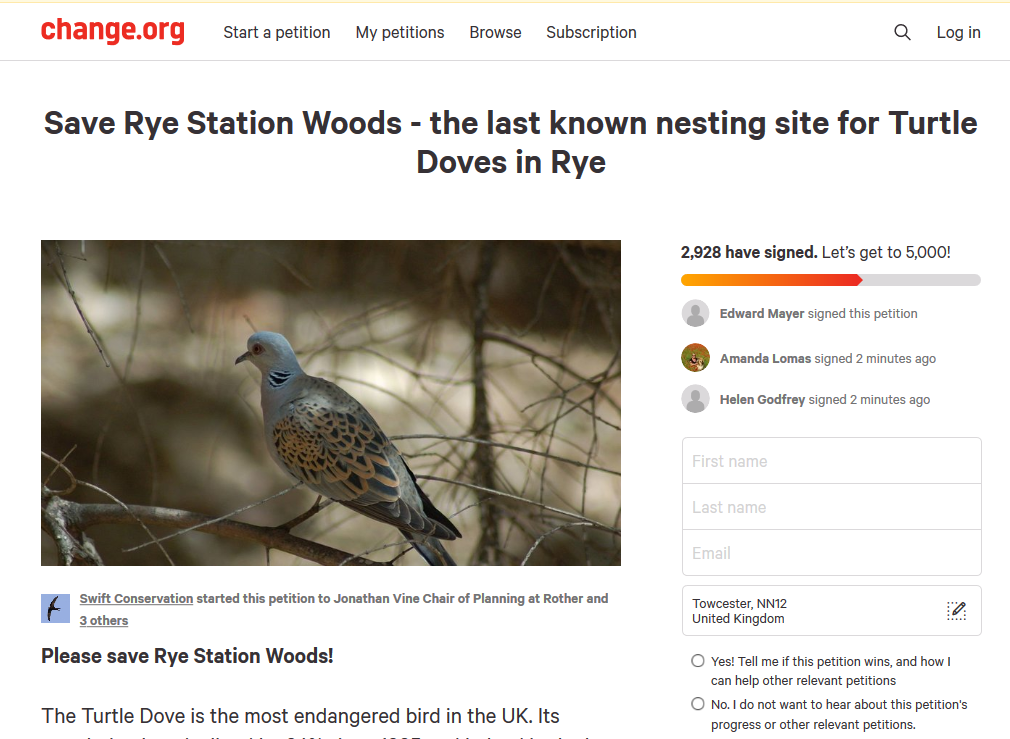
This is, as it says, a petition to save the last known nesting site for Turtle Doves in Rye, Sussex. It’s worth signing even though loss of nest sites is not the most important thing affecting Turtle Doves across the UK. This very rapidly declining species is almost certainly declining because of intense farming rather than nest site loss, shooting in the Mediterranean or disease (although the disease suggestion is quite difficult to knock down).
[registration_form]
I was watching the news round up on the Fieldsports Channel the other day (keeping an eye on the opposition rather than masochism) and was rather gobsmacked to find out the real reason the turtle dove is declining is competition with the collared dove! Well that’s us silly townies put right isn’t it? Apparently there’s an old saying ‘when you have a hammer every problem is a nail’, so the FC thinks the solution to the turtle dove’s plight is to kill collared doves clearly. You really couldn’t make this up, but the FC can.
When signing that one came across this one
https://www.change.org/p/northamptonshire-stop-the-400-year-old-3-oak-landmark-tree-being-cut-down-it-isn-t-even-in-the-way-of-the/psf/promote_or_share
Chown’s mill roundabout –
Think it is more complicated than conservationist make out.
Close to us we have a area called a Down that is completely wild and conservationists keep it with no farming, just a few sheep at certain times.
It is close to a thousand acres with perfect breeding places for Turtle Doves and yes we see very small numbers there maybe half a dozen although we perhaps only see three.
Why do they not increase in numbers as everything perfect and in their favour.
I am not disputing that intense farming is against Turtle Doves just that it is not that simple.
Les, can i ask what is your experience with turtle doves as you clearly don’t believe FC statement? I and others like me can tell you from experience of many years observing, by helping, creating food supply, habitat and successfully growing numbers of breeding pairs of turtle doves that where there are high numbers of collard doves it does have an effect on turtle dove numbers! Pushing them off feed and potential nest sites. Particularly when they first return and need to build up energy! Making them more vulnerable to predators! It’s about control and balance to help endangered species. yes i am a shooter! Also a life long naturalist and practising hands on conservationist. And it works! We have growing numbers in Suffolk and the stats to prove it! Look who the RSPB and other orgs come to for surveys advise and fitting sat tags on them. A lot of this comes from generations of farmers and shooters that are passionate conservationists. Doing so much for more for nature that very few know about or understand! From that knowledge and by educating others it’s not that hard. It is such a shame we can’t get on! I am tired of the attacks and name calling!
It’s condescion and bullshite I’ve had enough of.
You’ll all missing the point – this isn’t about the Turtle Dove or it’s decline – it’s about stopping building on my patch! All of us will have a local axe to grind about a new development springing up next to us. We underestimate the devastating effect of what I call ‘local extinction of species’, most is development projects, but equally it can be conservation measures, local council tidying projects, nature volunteers hacking 7 bells out of the habitat, due to fears of public liability claims, etc.
The UK is at the extreme of the Turtle Doves range, we know that for some of our migratory species there is a move to centralize migration (e.g., wryneck, red-backed shrike, etc.) this is happening as well the other way for Asiatic species.
Trying to create the perfect habitat for the Turtle Dove isn’t easily, we have been trying for seven years, and even though we have a tonnage of seed/insects in every field, hedgerows to die for, there’s something else that this bird wants.
We had a pair last year on the farm for the first time, hopefully more this year, but I believe this birds previous success depended on the inefficiency of human agriculture.
Any farmer who looked today at this farm would cringe at its natural state, but it isn’t in a mess because in nature there’s no such thing as inefficiently.